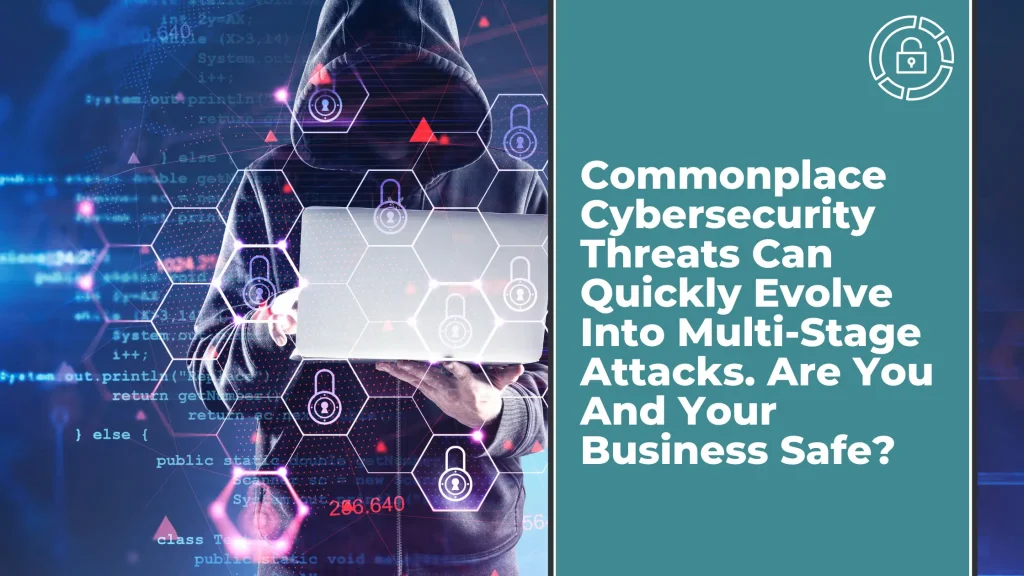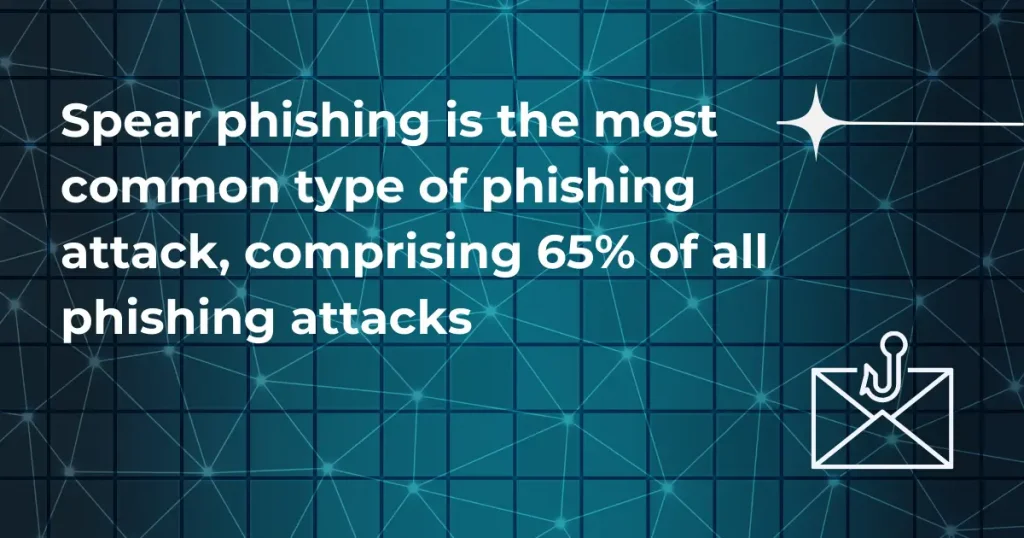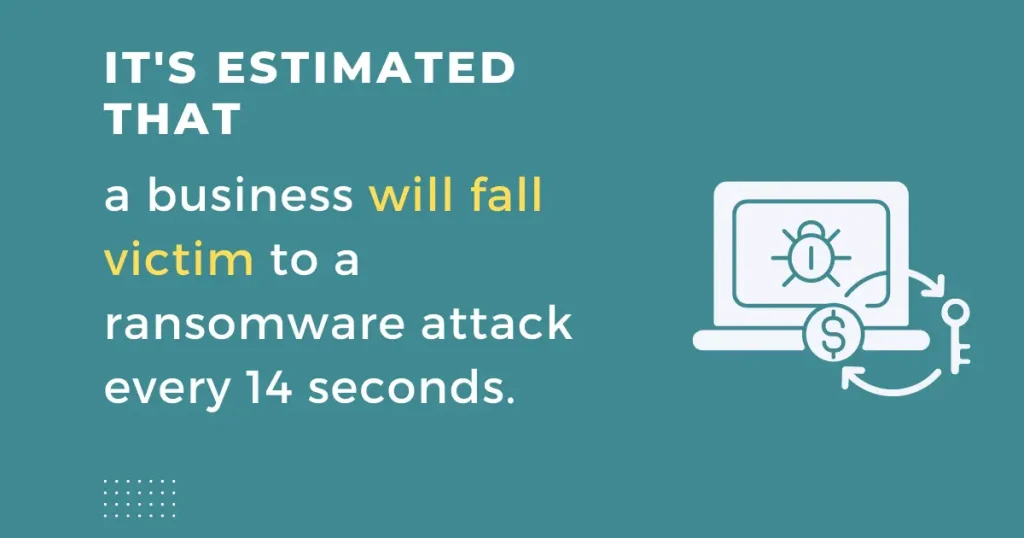
Chris Lawrence is a journalist and chief editor at Wlan Labs. He has been writing about technology for more than ten years. He writes about everything ranging from privacy to open source software. His goal is to educate readers about important topics to help make their lives easier.
We often get asked what the top cybersecurity threats are. You may not want to hear this, but unfortunately, it turns out that small to medium-sized businesses are just as much at risk from cyber security attacks as their larger counterparts.
These days, cyberattacks can be automated, allowing hackers to target thousands of businesses in one fell swoop.
Hackers still see small businesses as easy targets because they don’t always have a robust IT team. And they are often just as lucrative a target for hackers as bigger enterprises…
Small businesses often hold large amounts of customer data which they are obliged to protect (thank you, GDPR), and can at times deal with large sums of customer money to boot. Not to mention any B2B dealings.
You could argue that small businesses have more to lose when a cyber attack hits.
One report claimed that companies with under 500 employees lose an average of a whopping two and a half million dollars per attack. This is nothing short of devastating for a small business – can you imagine? And then there’s the reputational damage that comes with it.
However, being an easy target is expected since small businesses simply don’t have as much time and resources to plough into their cyber security.
But that doesn’t mean that you can’t put good, stringent tech defenses in place. Similarly, you needn’t be in the dark about what kind of cyber threats are out there these days…
Reading articles like this will put you in a good position, making you aware of different types of threats and explaining how to prevent them.
This article will walk you through the top 5 cyber security threats facing small businesses and explain how you can protect your business from them. Let’s get straight into it…
Please feel free to scroll ahead to any section that jumps out at you. Here goes.
1) Phishing Attacks
The largest, most debilitating threat that small businesses face is phishing attacks. Phishing attacks make up a whopping 90% of all data breaches faced by businesses.
Moreover, this has increased by 65% over the past 12 months. And it has been reported that phishing attacks account for over 12 billion dollars in business losses.
For those of you who don’t already know what a phishing attack is, it’s when someone pretends to be one of your trusted contacts and tries to get the receiver on an email to either give them access to sensitive information such as account details, or to download a malicious file, or click on a malicious link.

In recent years, phishing attacks have grown increasingly sophisticated as these attackers perfect their craft, learn from their mistakes and develop their skills. They can convince those on the receiving end that they are a real, genuine business contact.
And another thing to look out for is the Business Email Compromise, whereby a crook will use phishing campaigns to unlawfully obtain email account passwords before using these email accounts to fraudulently ask for payments from the contacts in that email account’s address book.
One reason phishing attacks can be so damaging to small businesses is that they’re quite tricky to deal with.
They don’t target technological weaknesses; instead, they leverage social and psychological tactics to get what they want. But, the good news is that there are some technological defenses that can protect your business from phishing attacks…
This includes getting a good, strong Email Security Gateway in place, such as Mimecast or Proofpoint Essentials since these can help prevent your employees’ inboxes from getting any phishing emails.
Alternatively, you could use something like Ironscales, an email security provider that’s entirely cloud-based.
Tools like Mimecast, Proofpoint Essentials, and Ironscales enable users to report any phishing emails that come through and also enable the administrator to delete them.
Whatever email security gateway you use, you can top this up with another layer of defense in the form of security awareness training. This way, your employees can take an appropriate course and learn how to spot a phishing email so they don’t fall for the crook’s tactics.
2) Malware Attacks
The next biggest threat faced by small businesses is malware attacks. Malware is shorthand for malicious software. Or in other words, any software intended to disrupt, damage, or gain unauthorized access to a computer system.
So malware is an umbrella term encompassing more specific cybersecurity threats such as viruses and spyware.
And it can come from various sources, including spam emails, malicious downloads from websites, or simply connecting to another device or machine that has already been infected.
What makes malware so damaging for small businesses is that it can effectively cripple your devices. What’s more, they can be really expensive to repair and replace.
Sure, you could try and find a way around it by having employees use their own devices, it would even save costs, but that’s not a good idea because personal devices such as smartphones are more vulnerable to malware attacks.
But, you needn’t be disheartened by this issue because there are measures you can put in place to prevent unwanted attacks…
We recommend using something like Endpoint Protection Solutions, which will provide you with a strong defense against malware downloads, along with a handy control panel for the administrator to keep an eye on the user’s devices and ensure that they’re perfectly secure and up to date.
And to prevent employees from visiting malicious web pages where malware can be downloaded, we recommend using Web Security.
3) Ransomware
Ransomware attacks hit thousands of businesses year on year, making them a very common form of cyber-attack. And the reason they are quickly becoming so common is because of just how lucrative they are.
A ransomware attack is when a hacker encrypts a business’ data so they can no longer access or use it. And then, the hacker demands that the business pays them a large sum of money as a ransom to return the data and unlock it.
This puts the owner in a very difficult position. They either pay up or cripple their own business’s services. Not to mention what it means for GDPR.
You’d think that these hackers would concentrate on larger enterprises, but sadly there are reports that ransomware attacks on small businesses account for 71% of the total. Worse yet, the average ransom demand comes at a whopping $116,000.

It is thought that the reason behind targeting smaller businesses is that their data is less likely to be backed up, and they are more likely to pay up because they need their systems up and running ASAP so as not to lose too much business.
Nowhere is this type of attack more keenly felt than in the healthcare industry, since once patient records are locked and healthcare appointments are canceled, this could mean that the business will be forced to close down unless the ransom demand is met.
This is why it’s so important that small businesses implement a data backup solution. Ideally, this backup of data should be cloud-based. That way, if data were lost on a hard drive of some sort, having a cloud-based backup that’s left untouched would help mitigate any data loss.
Once you have an effective data backup system in place, the business will not necessarily need to pay the ransom if a ransom attack were to take place. Moreover, the data can be recovered quickly, with minimal impact on business productivity.
4) Weak Passwords
To a lesser extent, another major cyber security threat small businesses face is weak passwords that can be easily guessed.
Small businesses often use a variety of different apps, which each require individual employee accounts. This way, there’s also a trail back to who did what in an organization, which is important for accountability and training.
But certain accounts will provide access to sensitive data, so you don’t want everybody to be able to access everything.
But the issue is that too many people use weak passwords or ones that are easy to guess or use the same password for multiple apps. And if a password is used by anyone other than the intended user, then all that data is compromised.
It is thought that a whopping 19% of professionals either share passwords across multiple apps or have passwords that are very easily guessed.
To counteract this problem, we recommend that businesses install a password manager app. Such platforms can suggest good, strong passwords that aren’t easily cracked.
You may also want to consider multi-factor authentication technology to add an extra security step before accessing an account, such as a passcode sent to a smartphone.
5) Insider Threats
And finally, we come to the most duplicitous threats to small businesses – those posed by insiders. Reports have shown that insiders bring about 25% of data breaches, and 62% of employees have access to data they don’t need.
And by insiders, I mean not only employees but also contractors, former employees and associates.
And any harm caused is not always a consequence of malice or greed but is often simple carelessness or ignorance.
To address the latter issue, small business owners must impress a culture of security awareness and vigilance. The business may also benefit from staff training, so employees can spot when data is compromised or accessed outside of the recommended guidelines.
What Are Cyber Security Awareness Training Solutions?
Security awareness training programs are designed to educate employees about the security risks their actions may pose to the company and how they can protect themselves and the company’s data.
Many of these programs use quizzes, games, or videos to help employees learn about potential threats, how to identify them, and what to do if they encounter one.
Some programs may also include phishing simulations in which employees are sent fake but realistic-looking email messages and asked to report any that they fall for.
Employees who have gone through security awareness training are often better equipped to protect themselves and the company from data theft, fraud, or other online threats.
Wrap Up
Now you’ve got through the article, you may feel daunted by all the cyber security threats out there. However, if you’ve been paying attention, you will have noticed that there are many things you can put in place to protect data, your equipment, and your business.
So before you start panicking about the threats your business may face, take control and stay on the website to find out more about apps you can access to give your business the protection it needs.
If you have some extra free time, you might want to read our definitive guide to cybersecurity.

